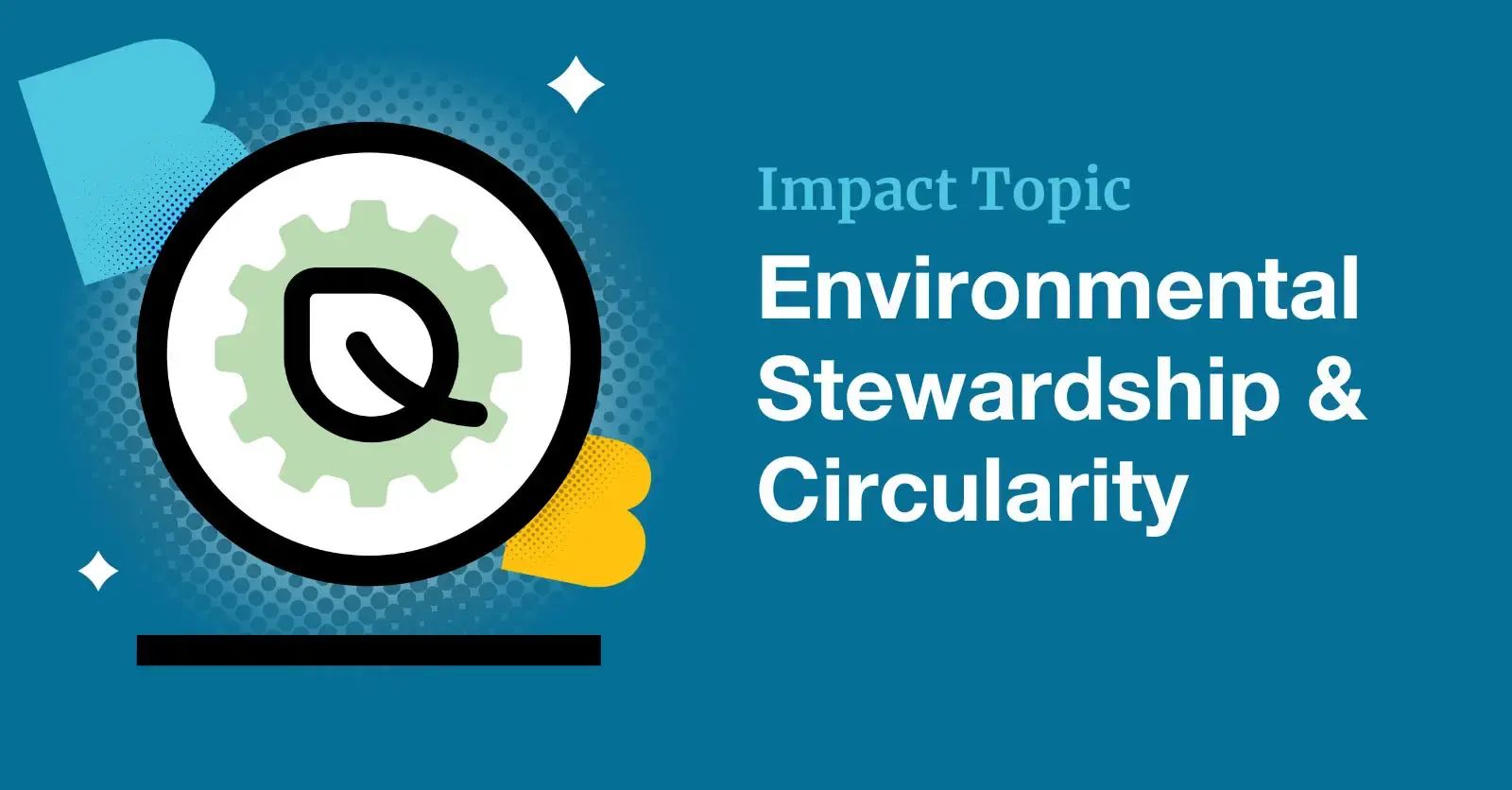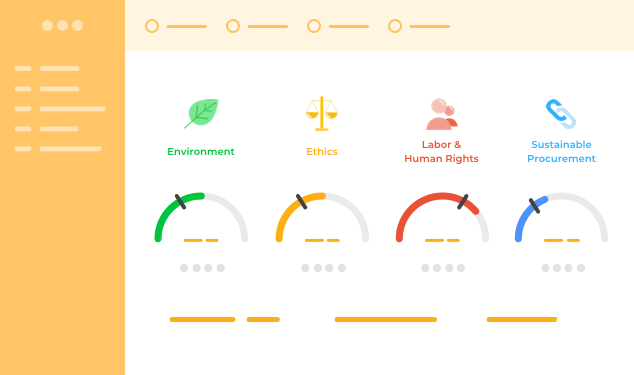
Raising the Bar for Sustainable Business
Since its founding in 2006, B Lab has been continuously redefining what it means to be a successful business - holding companies to rigorous standards of social and environmental performance, transparency, and accountability through its globally recognised B Corp Certification.
Key Terms
o Material Topics: Organisations’ most significant economical, social and environmental impacts.
o Circularity:
o Biodiversity: The different kinds of life found in an area, and their interactions.
o Ecological Thresholds: Scientific boundaries within global ecological systems that define the safe operating space for human activities, within which the ecosystems can support life.
B Lab Changes
B Lab’s latest standards update brings significant changes to the way companies are assessed. The former five Impact Areas - Governance, Workers, Community, Environment and Customers – have been replaced with seven updated Impact Topics:
Each topic introduces stronger expectations and deeper integration of sustainability into the core of business operations businesses accountable to more stringent social and environmental standards, moving beyond understanding environmental impacts to actively minimising them.
What is Environmental Stewardship and Circularity?
The topic of Environmental Stewardship and Circularity (ESC) challenges businesses to lead with purpose - becoming environmental stewards and embracing circular practices that reduce harm and regenerate natural systems. The goal isn’t just to minimise environmental impact, but to reshape how businesses interact with the planet entirely.
1. Purpose and Stakeholder Governance
2. Fair Work
3. Justice, Equity, Diversity & Inclusion
4. Human Rights
5. Climate Action
6. Environmental Stewardship & Circularity
7. Government Affairs and Collective Action
Key Requirements of ESC
• Understand and address significant environmental impacts across operations and supply chains.
• Operate sustainably within a circular economy model.
• Minimise negative environmental impacts in supply chains through transparency, accountability and targeted action.
As environmental crises like climate change, biodiversity loss, and water scarcity accelerate, companies are expected to adopt circular business models that restore nature, respect ecological thresholds, and deliver long-term value.
It is only through such changes that biodiversity can be stabilised by 2030 to enable the full recovery of natural ecosystems by 2050 — the target agreed by world leaders under the Convention on Biological Diversity. Environmental stewardship among companies is also critical to meeting the goals of the Paris Climate Agreement.
Environmental Stewardship:
Environmental stewardship refers to the responsible and sustainable management of the environment and its natural resources. It ensures that current actions don't harm the planet or future generations. It involves:
• Protecting ecosystems, reducing pollution, conserving resources, and promoting sustainable practices.
• Keeping business impacts within planetary boundaries.
• Minimising dependence on finite resources.
Certified and aspiring B Corporations are now expected to demonstrate clear leadership in this area - embracing environmental stewardship means contributing to a future where businesses, people, and the environment can thrive — without exploiting natural ecosystems and marginalised communities.
Circularity:
Circularity refers to practices which focus on reducing waste and extending the material use-times. In a circular economy, resources can be used efficiently, reused regularly and waste is designed out of the system. This focuses on:
1. Preserving natural capital by managing finite resources and regenerating renewable resources.
2. Maximising resource use through reuse and recycling initiatives.
3. Eliminating unintended negative consequences, such air and water pollution.
Governments – particularly in the EU - are mandating the integration of circularity principles within regulations such as the Circular Economy Action Plan (CEAP), a part of the EU’s Green Deal. ESC aligns companies with these frameworks, ensuring compliance with both regulatory and B Corp certification standards, in addition to targeted environmental action.
What’s Different Under ESC?
While ESC builds on B Lab’s previous environmental standards, it introduced more targeted and accountable expectations:
• Environmental Impact Assessments: Medium and large companies (except low-impact businesses in the service sector) must identify their most significant environmental impacts across their operations and supply chains.
• Environmental Strategy: Businesses must develop strategies that address these impacts, with a stronger emphasis on circularity. ‘Zero-waste-to-landfill’ targets have been replaced with material-focused goals.
• Biodiversity Commitments: Larger business, in addition to those for whom biodiversity is a material issue, need to develop biodiversity transition plans with value chain engagement and evolving targets.
• Portfolio-Wide Circularity: Companies must track circularity across their entire product and service range — not just select lines — and reduce non-circular products over time.
• Supply Chain Accountability: Large businesses must trace high-impact commodities and implement risk mitigation measures and targets. Notably, companies in specific investment-related industries need to assess the potential negative environmental impacts of their investments and take mitigation actions where necessary.
• Local Infrastructure Considerations: Product recovery must be aligned with the infrastructure available in the markets where products are sold. Companies are now expected to work to improve the recovery infrastructure available.
• Product and Service Delivery Contexts: Greater context and understanding is now being given to the recovery infrastructure present where products are sold – this aims to ensure companies work to improve the recovery infrastructure available.
• Tailored Expectations by Size:
o Smaller businesses are tasked with focusing on procurement and mitigation, without the need for the implementation of complex strategies.
o Service-based companies with minor footprint must now assess the environmental risks of their clients and projects.
o Larger companies face more stringent due diligence, strategy development and supplier engagement requirements.
Looking Ahead: ESC as the New Business Norm
With the integration of ESC, environmental responsibility is no longer a siloed initiative or a marketing add-on - it’s a baseline requirement for doing business. Certification now reflects a world where:
• Supply chains are transparent
• Resource use is intentional
• Biodiversity is protected
• Companies are held fully accountable for their environmental footprint
ESC isn't just a compliance framework - it's a signal of a deeper shift in global business culture toward regeneration, responsibility, and resilience.
How We can Help
As leading B Corp advisors, we help companies navigate the certification journey with confidence and clarity. Our team of sustainability consultants can work with you to:
• Streamline your path to certification
• Minimise your team’s time investment
• Maximise learning and internal capacity
• Deliver measurable environmental impact and business value
We don’t just help you tick boxes — we help you unlock value, drive stakeholder engagement, and future-proof your business through sustainable transformation.
Let’s build something better — for business and the planet.



